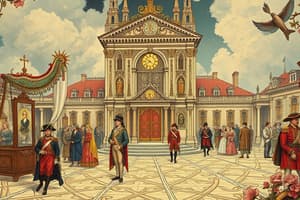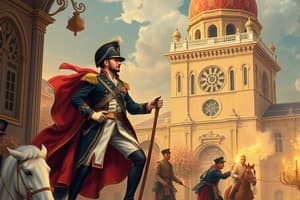Podcast
Questions and Answers
What was a significant impact of the Industrial Revolution on manufacturing?
What was a significant impact of the Industrial Revolution on manufacturing?
- Decreased urbanization
- Shift towards manual labor
- Decreased efficiency and scale of production
- Introduction of steam power (correct)
Which event transformed the European balance of power in the 19th century?
Which event transformed the European balance of power in the 19th century?
- Industrial Revolution
- The French Revolution
- Congress of Vienna (correct)
- Colonialism
What was a key goal of European colonial powers expanding through colonization?
What was a key goal of European colonial powers expanding through colonization?
- Acquisition of resources and markets (correct)
- Encouragement of indigenous cultures
- Creation of strong alliances with local rulers
- Promotion of self-governance in colonies
Which individual played a significant role in extending European influence globally during the 19th century?
Which individual played a significant role in extending European influence globally during the 19th century?
What impact did the French Revolution have on Europe?
What impact did the French Revolution have on Europe?
Which historical development paved the way for modern economic growth?
Which historical development paved the way for modern economic growth?
What key event marked the beginning of the French Revolution?
What key event marked the beginning of the French Revolution?
Who emerged as a prominent leader during the French Revolution and later became the French Emperor?
Who emerged as a prominent leader during the French Revolution and later became the French Emperor?
Which major European event followed the Napoleonic Wars and aimed to establish stability on the continent?
Which major European event followed the Napoleonic Wars and aimed to establish stability on the continent?
What concept of international cooperation emerged from the Congress of Vienna?
What concept of international cooperation emerged from the Congress of Vienna?
Which leader played a crucial role in shaking the European order during his rise to power?
Which leader played a crucial role in shaking the European order during his rise to power?
Which event signaled the transformation of France into a republic during the 19th century?
Which event signaled the transformation of France into a republic during the 19th century?
Flashcards are hidden until you start studying
Study Notes
The 12th Chapter: Transformations and Tensions in the 19th Century
The French Revolution (1789-1799)
Amidst the backdrop of a monarchy rife with financial troubles and a restless populace, the French Revolution transformed France from an aristocratic society into a republic. Key events such as the storming of the Bastille, the Reign of Terror, and the rise of Napoleon Bonaparte shaped the revolutionary era. The French Revolution signaled the birth of modern democracy and set the stage for future political and social reforms.
Napoleon Bonaparte (1799-1815)
Born from the crucible of the French Revolution, Napoleon Bonaparte rose to become the French Emperor, shaking the European order like no other leader before him. His strategic genius, military prowess, and charismatic personality drove his meteoric ascent, helping him establish the First French Empire and expand French influence across Europe.
The Congress of Vienna (1814-1815)
In the aftermath of the Napoleonic Wars, the Congress of Vienna sought to restore order and stability to a continent fractured by conflict. The congress, attended by the major European powers, restructured the map of Europe, creating new nation-states, and enforcing a balance of power to prevent future conflicts. The congress laid the groundwork for a "concert of Europe," a concept of international cooperation that would endure for generations.
The Industrial Revolution (1760-1840)
The Industrial Revolution began in Britain, ushering in sweeping changes to manufacturing, transportation, and communication. The mechanization of production and the introduction of steam power significantly increased the efficiency and scale of industrial processes. The Industrial Revolution paved the way for the rise of factory systems and urbanization, profoundly altering the social and economic landscape of the Western world.
Colonialism and Imperialism (16th-20th Century)
Colonialism and imperialism, though not exclusively a 19th-century phenomenon, reached their zenith during the era under consideration. European powers, such as Britain, France, and Spain, expanded their territorial reach through colonialism, establishing colonies across Africa, Asia, and the Americas. These colonial powers sought resources, markets, and political influence, leading to widespread cultural, economic, and political transformation in the colonized territories.
These transformations and tensions of the 19th century set the stage for the globalized world we inhabit today. The French Revolution brought democracy to Europe, Napoleon Bonaparte transformed the European balance of power, and the Industrial Revolution paved the way for modern economic growth. Meanwhile, colonialism and imperialism extended European influence across the globe and laid the foundation for the dynamics of the modern world system.
Studying That Suits You
Use AI to generate personalized quizzes and flashcards to suit your learning preferences.




